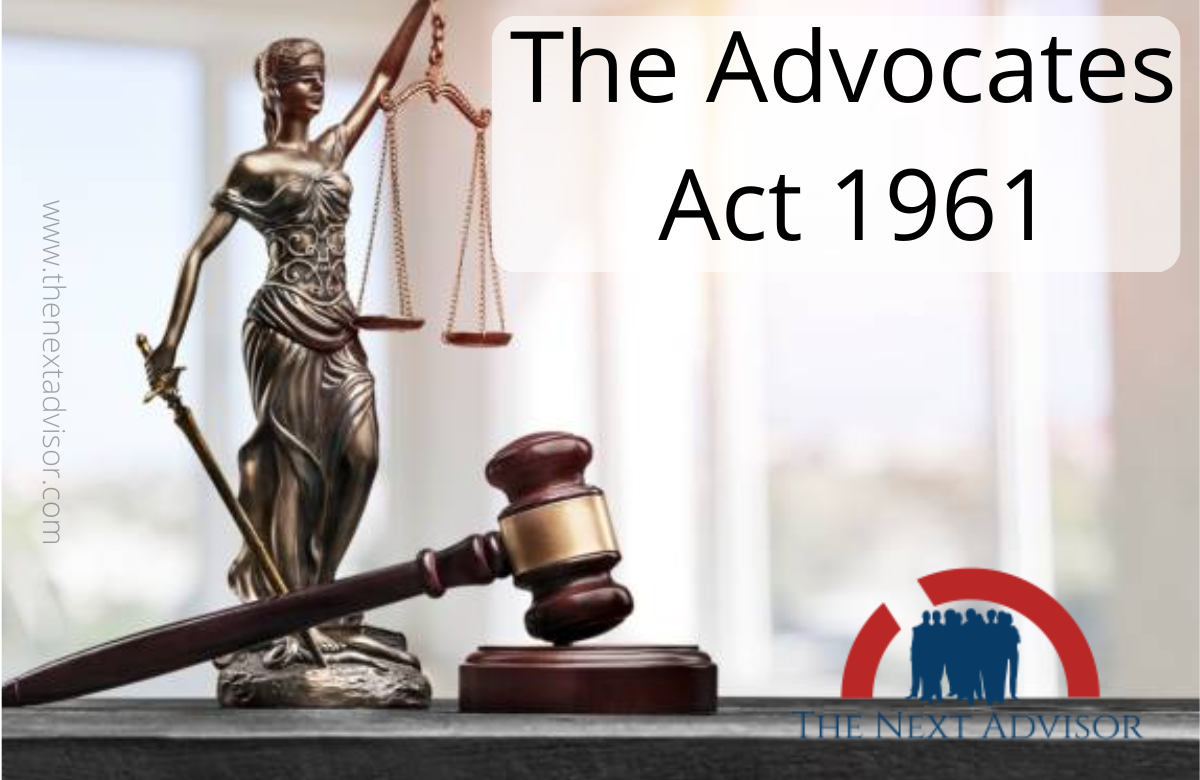THE ADVOCATES ACT 1961 History of Advocates Act:
The Advocates Act 1961 & The Indian High Courts Act, 1861 ( Commonly known as the Charter Act ) passed by the British Parliament enabled the Crown to establish High Courts in India, and authorized and empowered the High Court to make rules for the enrolment of advocates and attorneys ( commonly known as solicitors ). The law relating to legal practitioners can be found in the Legal practitioners’ Act, 1879, The Bombay Pleaders Act, 1920, and Indian Bar Councils Act, 1926.
THE ADVOCATES ACT, 1961 History of Advocates Act:
After Independence, it was deeply felt that the Judicial Administration in India should be changed according to the needs of the time. In the meanwhile, the All India Bar Committee went into detail about the matter and made its recommendations in 1953. The Bill, being a comprehensive measure, repeals the Indian Bar Councils Act, 1926, and all other laws on the subject.
Main features of this Act:
The establishment of an All India Bar Council and a common roll of advocates and having a right to practice in any part of the country and in any court, including the Supreme Court.
The prescription of a uniform qualification for the admission of persons to be advocates.
The division of advocates into senior advocates and other advocates is based on merits.
The creation of autonomous Bar Councils, one for the whole of India and one for each state.
THE ADVOCATES ACT, 1961 Introduction of Advocates Act:
Short title – The Advocates Act, 1961
Extend – To the Whole of India
Date of Enactment – 19th May 1961
Act No. – 25 of 1961
Total Sections – 60 Sections
Total Chapters – 7 Seven Chapters
Purpose :
The purpose of the Advocates Act 1961
1. Amending and consolidating the law relating to legal practitioners.
2. Providing the Constitution of the State Bar Council
3. Establishment of All India Bar Council ( BCI ).
Functions:
Functions of the Advocates Act 1961
1. To provide for admission and enrolment of advocates;
2. To lay down standards for professional conduct and etiquette for advocates :
3. To lay down the procedure to be followed by its disciplinary committee and disciplinary committees of the State Bar Councils;
4. To safeguard the rights, privileges, and interests of the legal practitioners;
5. To exercise general control and supervision over the State Bar Councils:
6. To promote legal education and to recognize Universities whose law degrees shall be accepted for enrolment as an advocate;
7. To conduct seminars, symposia, workshops, etc. to promote law reforms and improve the quality of the legal profession in India;
8. To provide for elections of its members.
The Act provides for 2 classes of advocates i.e.
Senior advocates and other advocates
The State Bar Councils are required to maintain rolls of advocates and send copies thereof to the Bar Council Of India.

The Advocates Act 1961
Section 24 of the Advocates Act
The conditions for eligibility to be enrolled as an advocate are provided in this section of the Act >>
• a citizen of India, provided, however, a national of any other country may also be enrolled as an advocate in India, if the country to which he belongs, permits duly qualified citizens of India to be enrolled for legal practice in that country,
• he has completed the age of 21 years:
• he has obtained a degree of law from any University recognized by the BCI for this purpose;
• he fulfills such other conditions as may be prescribed by the rules made by the State Bar Council;
• he has paid the requisite enrolment fee to the State Bar council.
However, the enrolment fee payable by the members of the scheduled castes or scheduled tribes is reduced to half of this amount.
The Advocates Act 1961, further provides:
Section 24 A of this act lays down the disqualification for enrolment as an advocate. A person who is convicted of an offence involving moral turpitude or an offence under the Civil Rights Act. 1955 shall be disqualified from being enrolled as an advocate. However, this disqualification shall cease to have an effect on the expiry of a period of two years from the date of his release.
But this disqualification does not apply in the case of a person who was found guilty of any of the aforesaid offences, but dealt with under the provisions of the Probation of Offences Act, 1958.
An application for enrolment as an advocate shall be in the prescribed form to the State Bar Council within whose jurisdiction the applicant proposes to practice.
Section 10 of the Advocates Act empowers the State Bar Councils to constitute special committees other than the disciplinary committee, executive committee, etc . , while section 15 empowers the State Bar Councils to make rules.
The penalty for illegally practicing in courts or before other authorities is contained in section 45 of the act. This may extend to imprisonment of up to six months.
With the coming into force of the Advocates Act, 1961, the earlier State Bar Councils ipso – facto stood dissolved.
























